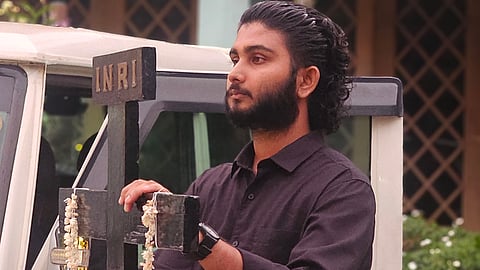

A shroud of silence envelops Fort Vypeen after the last ferry from Fort Kochi docks at the jetty. From one of the narrow alleys near the historic Our Lady of Hope Church emerges 26-year-old Godson Gladwin, carrying a large wooden cross and accompanied by a group of young men.
Quietly, they assemble in the courtyard of the imposing church built by the Portuguese in 1605. Gently resting the cross on the ground and clutching its arms with both hands, Godson gazes towards the dark sky and in a loud, husky voice begins to chant “Bendit e lauvado seja, O divinissima Sacramento, Ea Purissima Conceicao de Virgem Maria Senhora (Praise and glory to the Most Blessed Sacrament and the Virgin Mary who was immaculately conceived)”.
The haunting chant in Portuguese resembles a lament and together with the rattling sound of the accompanying wooden clacker, it pierces the solitude, exuding an eerie charm.
This young man is performing Devostha, an ancient ritual dating back to the Portuguese period that is believed to exorcise the land of malevolent spirits.
Although the Malayalam version of Devostha is performed in the coastal hamlets of Kochi and Alappuzha during Lent in the Christian calendar, Fort Vypeen remains the only place where its Portuguese version is performed and Godson its sole custodian.
Said to be introduced in Kochi and neighbouring areas by St Francis Xavier in the 1500s, Devostha is performed by men in open spaces close to midnight during Lent.
In Fort Vypeen, its Portuguese version was zealously treasured by the Anglo Indians for centuries until its last cantor Howard Hendricks passed away more than a decade ago.
Though he is not a part of the community, Godson is proud to preserve the legacy and walk in Hendricks’ footsteps. As a child, he was fascinated by the haunting chants of Devostha rendered by Hendricks in his baritone voice.
“I always used to follow Hendricks and his confreres when they went around chanting in a strange tongue. As I grew up, the love for it got so strong that I learned to chant it by the time I was in Class X,” says Godson, who is pursuing a course in German after having graduated in physics from St Albert’s College, Ernakulam.
Today, he knows all eight stanzas of the chant by heart and renders it during the Lenten season, paying great detail to the intonation.
He explains that the lyrics contain supplications for souls in purgatory, those who are travelling and those who are in a sinful condition.
“It is basically a sort of exorcism. We are not supposed to turn back and look while chanting nor are we allowed to stop even if there is a sudden downpour or strong gusts of wind,” says Godson, adding that there have been paranormal experiences while performing the ritual.
He recounts a recent incident when they were surrounded by a pack of strays at Vypeen beach while the Devostha was being sung. “Suddenly, a few dogs began to howl and refused to leave despite several attempts to chase them,” he recalls.
During the 40-day Lent, Godson and his team perform Devostha every Monday, Wednesday and Friday.
“During the period, we have to abstain from fish, meat and intoxicants and prepare ourselves spiritually,” says the cantor, who wishes to teach the ritualistic art form to younger generations to ensure its continuity.
Though he knows to sing the Devostha in Malayalam, Godson is more inclined towards its Portuguese avatar. According to historians, Devostha originated from the Portuguese word devocao, which means devotion.
Male members of the Latin Catholic community in coastal hamlets spread across Alappuzha and Kochi have kept the tradition alive. The language used is Malayalam, but it has several Tamil words and archaic usages.
Experts point out its similarity to the ‘Shema Yisrael’ call to prayer of the Jews and the Azaan of the Muslims.
In the opinion of the late Francis Paynter, an expert on the colonial history of Fort Kochi and Vypeen, the Moorish domination of the Iberian Peninsula influenced the music of Portugal. That could be one reason for Devostha’s similarity to the Islamic call to prayer.